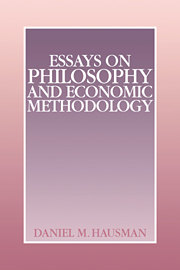Book contents
- Frontmatter
- Contents
- Introduction: What is philosophy of economics?
- PART I METHODOLOGY AND THEORY APPRAISAL
- PART II CAUSALITY IN ECONOMICS
- PART III CASES AND PUZZLES
- 12 What are general equilibrium theories?
- 13 Arbitrage arguments
- 14 Explanatory progress in economics
- 15 On dogmatism in economics: the case of preference reversals
- PART IV POSTSCRIPTS
- Bibliography of relevant writings by Daniel M. Hausman
- Bibliography of works by other authors
- Index
12 - What are general equilibrium theories?
Published online by Cambridge University Press: 05 June 2012
- Frontmatter
- Contents
- Introduction: What is philosophy of economics?
- PART I METHODOLOGY AND THEORY APPRAISAL
- PART II CAUSALITY IN ECONOMICS
- PART III CASES AND PUZZLES
- 12 What are general equilibrium theories?
- 13 Arbitrage arguments
- 14 Explanatory progress in economics
- 15 On dogmatism in economics: the case of preference reversals
- PART IV POSTSCRIPTS
- Bibliography of relevant writings by Daniel M. Hausman
- Bibliography of works by other authors
- Index
Summary
A little philosophy of science can be a troubling thing. Simplified treatments of philosophy of science maintain that scientists formulate generalizations or theories, derive implications from them, and retain these generalizations or theories (albeit with some caution) as long as they pass the experimental tests. This story is heavily oversimplified, and its general inadequacies are familiar and shall not be repeated here. But this story is both well-known and a simplification of a truth, not mere error.
If one accepts this oversimplified vision of science, much work in theoretical economics is hard to understand, for it clearly does not consist in the presentation and examination of testable theories. Much of it is, instead, better interpreted as conceptual development, and not a less significant part of empirical science for this interpretation.
In this paper I shall focus on a particular stream of theoretical work in economics concerning which controversy and dispute have raged. The elegant theories of general equilibrium which have been developed during the past three decades have left many economists puzzled, since they appear to have little to do with real economies. Gerard Debreu in his classic Theory of Value states that his theory is concerned with the explanation of prices (1959, p. ix). Others as distinguished as Kenneth Arrow and Frank Hahn deny that general equilibrium theories are explanatory (1971, pp. vi–viii). Moreover, some prominent economists (Blaug 1980, pp. 187–92) and prominent philosophers (Rosenberg 1983) have argued that work in general equilibrium theory is not empirical science at all.
- Type
- Chapter
- Information
- Essays on Philosophy and Economic Methodology , pp. 165 - 171Publisher: Cambridge University PressPrint publication year: 1992



